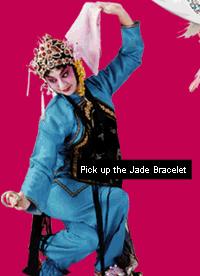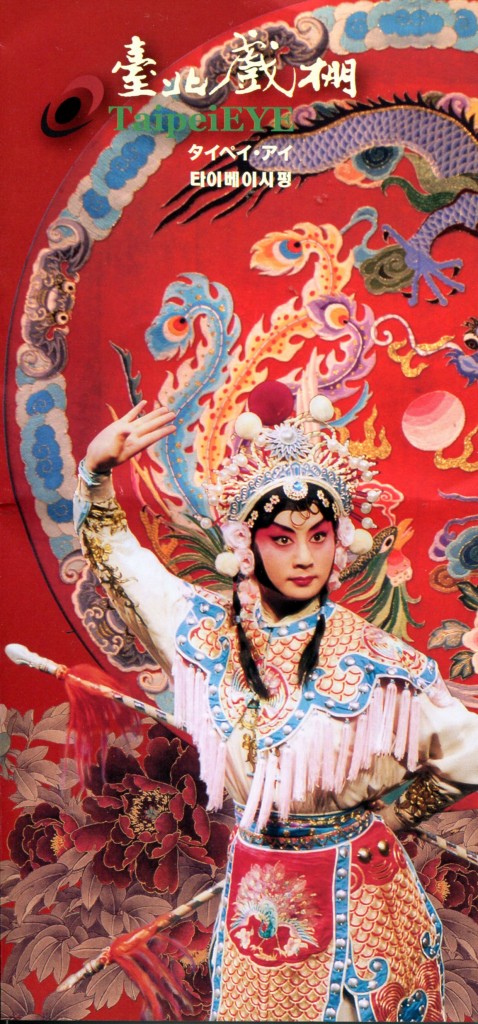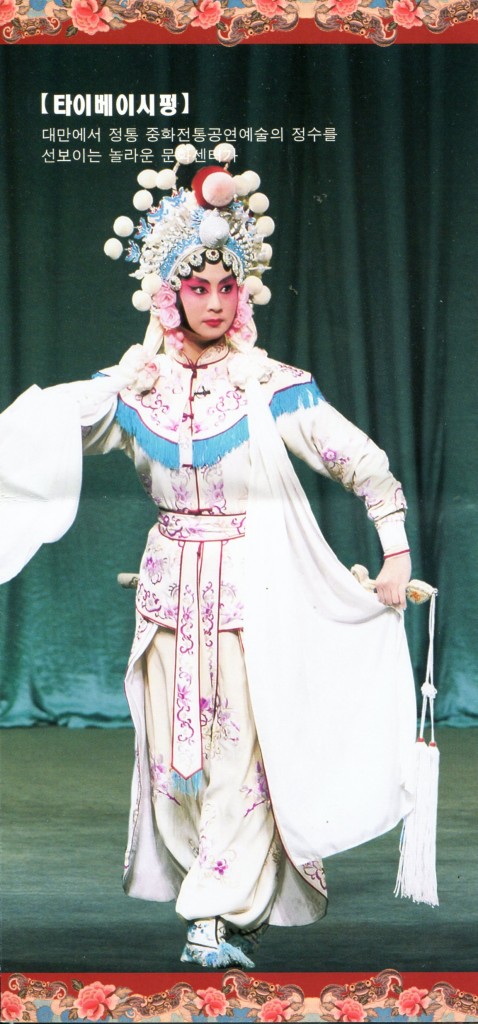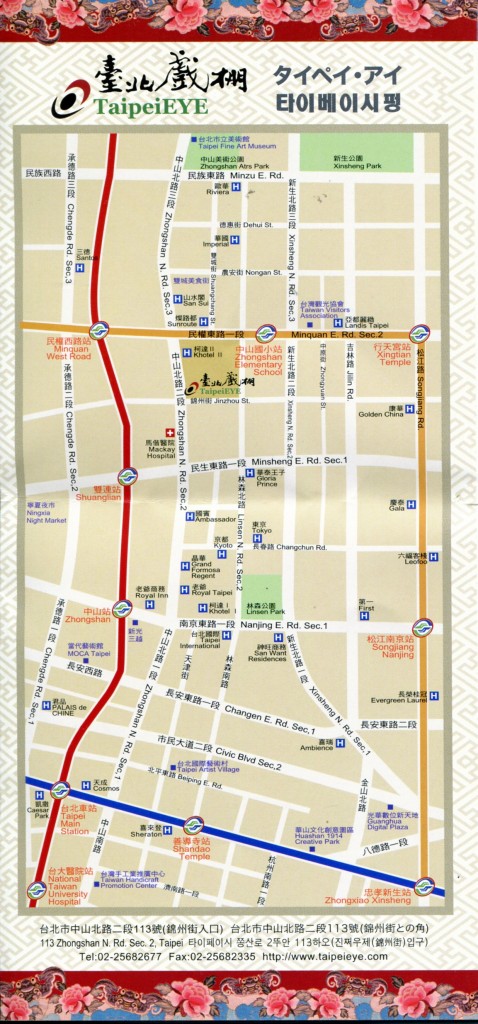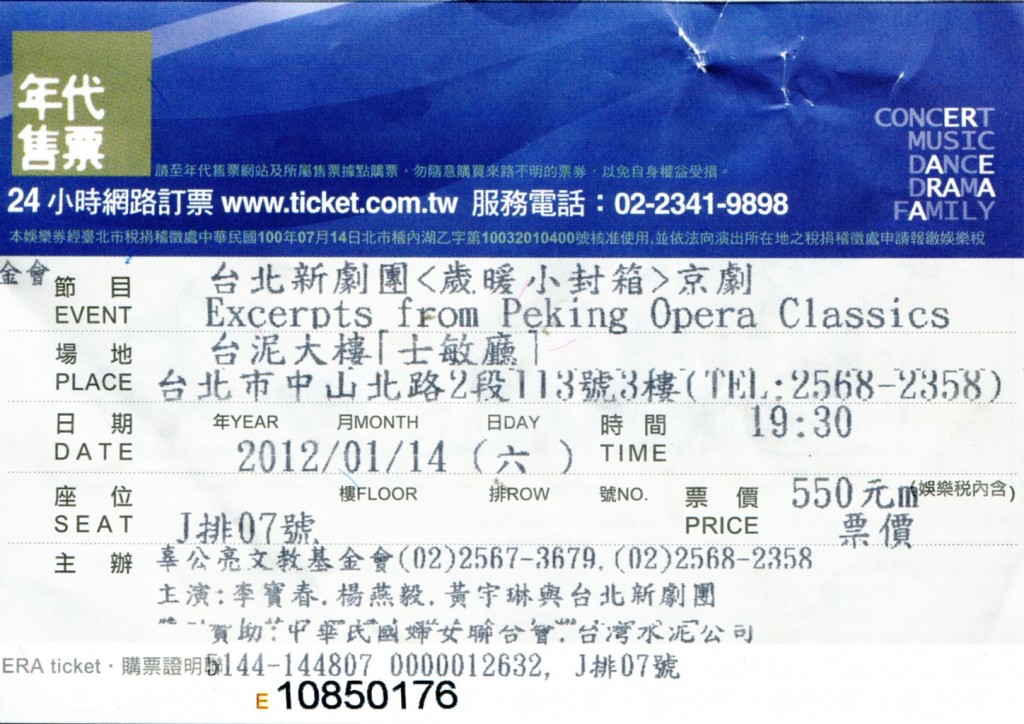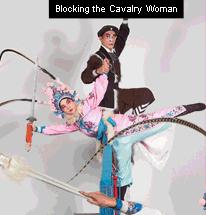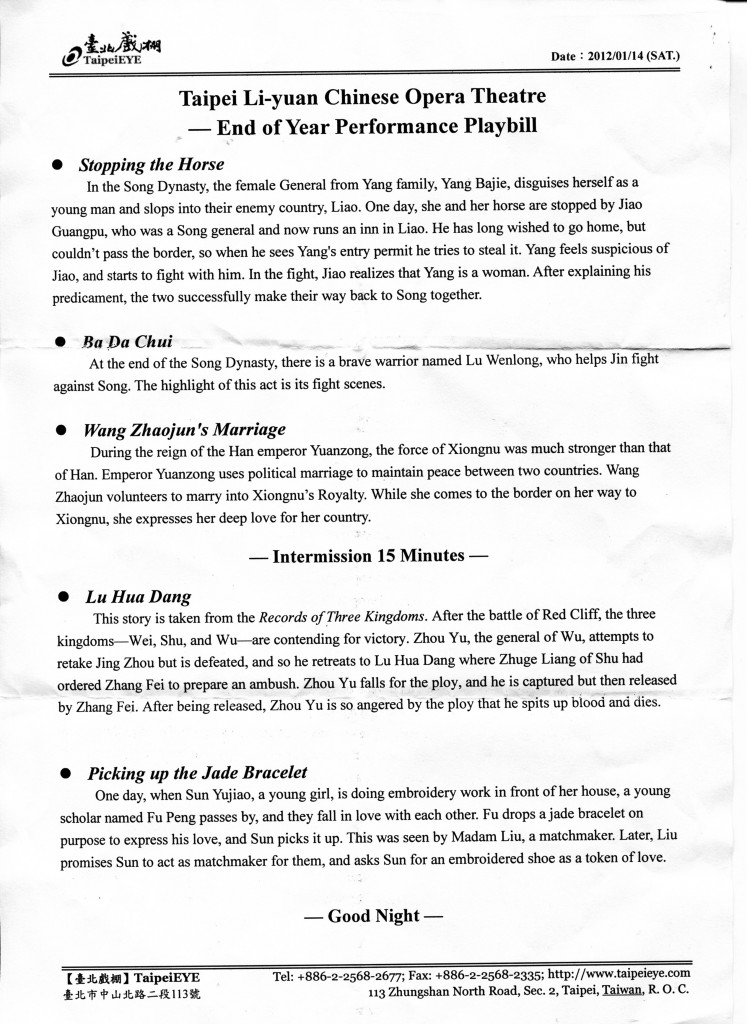TaipeiEYE – Picking Up the Jade Bracelet
The man at center stage was wearing a very colorful and elaborate costume. He stood there for a moment and then slowly raised one leg and pointed his foot at the audience like it was a kind of weapon. On his foot was a shoe with a three- or four-inch-thick white wooden platform. He grabbed his foot with one hand, twisted it to the side and deliberately raised it up until it was high above his head. Then he lowered his body to the ground on his other leg – the only one supporting his weight. With a display of strength and balance, he raised himself back up. Down he went and then back up a second time. The audience exploded with cheers, applause, shouts, and loud grunts from the older men. Then, unexpectedly, the man went down and up a third time. The audience practically threw itself out of its chairs with the enthusiasm of its applause. The music played on, screeching and wailing with tones unfamiliar to the western ear. A woman came out and sang in an unearthly falsetto, her voice like nothing I’d ever heard before. This, of course, was a night of Peking Opera.
The performance was taking place at TaipeiEYE, a place I’d had my eye on for quite a while. You can forgive me that weak joke. I think this play on words was fully intended by the founders. Here, for example, is a quote from TaipeiEYE’s brochure: “Where Eye-Opening Cross-Cultural Encounters Continue!”
To be honest, I really had no idea what TaipeiEYE was for the longest time. I had come across their brochures many times and I knew that it was a performance venue. They advertised folk music, aboriginal dance and music, and traditional Peking Opera. The brochure struck, perhaps, an unfortunate tone, making it sound like a cheap and gaudy thing put on for “tourists”. That’s one of the reasons I hadn’t gone for so long. On Friday night, however, I walked up Zhongshan Road to see if I could find the building. It is located at 113 Zhongshan North Road Sec 2, about equidistant from the Minquan West Road MRT station and Shuanglian MRT station. I got there in just a few minutes, and I was surprised to find a somewhat elegant and new building. I popped through the glass doors at the entrance on Jinzhou St. and was greeted by quite a number of polite and cheerful ushers and ticket-takers decked out in black suits. The tone, much more black-tie than tourist trap, pleased me, and I went up to the small ticket office to see about purchasing a ticket for Saturday night.
According to the brochure and their website, there are performances every Monday, Wednesday, and Friday night at 8:30 p.m. and on Saturday night at 8:00 p.m. Tickets are NT$550 for the weeknight performances and NT$880 for Saturday night. It’s best to check beforehand, though, because that Friday and Saturday, the performances actually started at 7:30.
The people at the ticket office were very friendly and I chatted with them for a while. I understood that the performances were almost always sold out, and you’d have to get tickets in advance if you wanted to be sure of a seat. They still had some seats for the Saturday night performance, and for some reason, they were NT$550 not NT$880. I got the impression that this was not a typical performance. It was a special end-of-year performance, and among other things this meant that there were no English subtitles. I tried to find out what the connection was between this being the end of the year and the lack of English subtitles, but I couldn’t get an answer. I also tried to get a sense from them if it mattered whether there were subtitles or not. I felt that it wouldn’t matter that much. I saw from the playbill that rather than one full opera, they were putting on five excerpts from various famous operas. That meant there wouldn’t be a single storyline to keep track of, and the playbill had a summary in English of each excerpt. I figured it would be easy to follow along. I wouldn’t understand everything, but I didn’t think it would matter to my enjoyment of it. That was my idea, but I couldn’t get the ticket-sellers or the ushers to jump one way or the other on that question. I don’t think they quite understood what I was getting at.
In any event, I bought a ticket (Row J, Seat 07) and returned on Saturday evening for “Excerpts from Peking Opera Classics” by the Taipei Liyuan Chinese Opera company. The playbill listed the following performances: Stopping the Horse; Ba Da Chui; Wan Zhaojun’s Marriage; Lu Hua Dang; and Picking up the Jade Bracelet.
Lots of excited people were crowded into the lobby of the theater. I’m no expert on this, but my sense was that the majority of them were tourists from China. There was a certain rustic and overly-formal quality to them. Many of the men were in full three-piece suits that looked like they were purchased decades ago and rarely came out of the closet. In the bathroom, I was startled by a series of loud and savage throat-clearing and spitting noises. The first time it happened, I actually jumped like a frightened horse. The throat-clearing was so brutal, I expected to see blood being spit out. I don’t think one hears that kind of thing at that intensity anywhere but in China.
The theater itself was on the third floor, and we had to take elevators to get there. We all crowded around the ushers, and they took our tickets there before we got into the elevator. Exiting the elevator, I found myself in another small lobby. Tables were arrayed around the room and were loaded down with souvenirs ranging from CDs to T-shirts and coffee mugs. I didn’t know it at the time, but I think it was possible to go behind the scenes and see the performers getting ready. That is one of the unique aspects to TaipeiEYE – it aspires to be interactive and involving, and the brochure states that the performers interact with the audience before and after the show even in the open make-up rooms and photo areas. I hadn’t expected that, so, unusually for me, I hadn’t brought a camera. My last experiences with cameras hadn’t gone well. I’d taken one out at the National Theater and been nearly tackled by three very intense ushers who had come running at me waving their arms in the air. At TaipeiEYE, photography is encouraged.
The theater was mid-sized, seating about 300 people, and had a pleasant and intimate air about it. There was no curtain in front of the stage and performers simply walked onstage from the left or the right – almost always to intense and loud applause and cheers. Spotlights shone the Chinese characters for happiness, prosperity, and longevity on both side walls. While I waited for the seats to fill up and the performance to begin, I skimmed the brochure. I learned that TaipeEYE’s story began in 1915 with Mr. Xian-Rong Koo “from one of the Taiwanese royal families.” He purchased the Tamsui Theater from the Japanese owner, renovated it and renamed it the “Taiwan Novel Hall.” He invited the Peking Opera from Shanghai and the Taiwanese Opera Troupe from Fukien Province to perform. During World War II, Taiwan Novel Hall was “savagely turned to ashes and ruined by the heartless American bombings.” The brochure then states that Mr. Xian-Rong Koo lost his “fortress” and died before the end of the war. I assume that is a typo and Mr. Xian-Rong Koo actually lost his “fortune.”
In 1989, Mr. Xian-Rong Koo’s son established a culture foundation and worked with Mr. Bao-Chun Li, who founded the Taipei Liyuan Chinese Opera company. In 2002, the Taiwan Cement Company built the Taiwan Cement Building, where TaipeiEYE is located. The rest is recent history, and you are now invited to “enjoy a romantic evening with the mystical local colours of the brilliant international standard.”
Punctuality is, apparently, one part of the international standard that has not yet arrived in either China or Taiwan, and the first performance was interrupted constantly by groups of people large and small arriving late and having to be shown to their seats. Nice as the theater was, the floor seemed quite flimsy. It seemed almost hollow and thin and people’s footsteps gave off a thundering sound, and this plus the light from the doors opening and closing was a constant distraction. Those down in the front rows felt compelled to take pictures during the performances themselves, and, much as it was part of the overall personal and intimate tone of the evening, I felt this was something that should be discouraged. True, these people did know enough to turn off the flash on their cameras, but the bright LCD screens facing backward toward me and the rest of the audience were quite annoying and distracting.
Still, I eventually got past these minor annoyances and began to enjoy the evening. In fact, the noise and interruptions felt somehow appropriate. I know next to nothing about the origins of Peking Opera, but I sense that it has to have at least some roots in village performances – traveling troupes who go from farming village to farming village and perform on the road. What else can explain the bizarre combination of elements in Peking Opera? With the harsh nasal and atonal singing, the elaborate costumes, the acrobatics, and the simple traditional instruments wailing away, it has to be one of the strangest performing arts in the world. I can’t even imagine, to be honest, how all these different things came together.
The audience felt, to me, like a gathering of hardworking village farmers getting a rare treat and a break from the drudgery of country life. There was a willingness to participate in the audience that you don’t see in other performing arts. In fact, I found myself looking around the audience and wondering what I was missing. There was a familiarity there that made me think everyone in the audience was part of a big family and the performers were their sons, daughters, cousins, aunts, and uncles. They couldn’t be, of course. The performers were part of a professional company and the audience was simply a random assortment of tourists and locals. Yet, I felt like I was in a village from long ago, sitting on the ground with a makeshift stage in front of me. The audience seemed – and I don’t know a better word – delighted. They were delighted with everything and everyone. Their applause was not perfunctory. It broke out constantly as if they could barely contain themselves. And the older men let loose with a loud bassy grunt that seemed to be the Peking Opera equivalent of “Bravo!” There was one man in front of me who literally fell out of his seat with the energy of his applause. The woman beside me let out gasp after gasp of utter awe and astonishment when one of the performers completed a back flip or a somersault.
I hate to say it, but I wasn’t as impressed as my fellow audience members. Perhaps I’m spoiled with the pyrotechnics and stunts that one sees in modern movies, but it takes a bit more than a series of back flips to get a gasp out of me. I mean, I was enjoying the performance. It just didn’t seem to warrant the kind of awed enthusiasm coming from the audience. All of this kept me looking around trying to figure out what I was missing.
I think one thing I was missing was a sense of familiarity. I had never seen any of these performances before, but I think they were utterly familiar to everyone else. They had seen them before, had grown up with them, and knew them as well as I know the famous scenes in Star Wars. They knew every character that was going to emerge, and they greeted them like old friends. It would be like me going to see some local theater production of some excerpts from Star Wars. I’m sure Darth Vader’s first appearance on stage would be greeted with loud and crazy applause. The audience would probably shout “Luke, I am your father!” when Darth gets to that famous clichéd line. Madam Liu, the matchmaker from Picking Up the Jade Bracelet, is probably the Peking Opera equivalent of Darth Vader. In any event, Madam Liu only had to show her face on stage to be greeted with applause and cheers that shook the theater. I was astonished.
To back up though, the first performance was Stopping the Horse. It was, like all the others, quite small in scale. It involved only two performers – Yang Bajie, a female general who had disguised herself as a young man, and Jiao Guangpu, a Song general who now ran an inn. Yang Bajie, the female general disguised as a man, had travel permits in a pouch hanging from her belt. The entire action of the excerpt is based on Jiao Guangpu, the Song general now inn-keeper, first trying to pickpocket those travel permits and then take them by force. It was all done with the humor of a farce as Jiao Guangpu constantly tries to sneak up behind Yang Bajie and slyly steal the permits. She turns and discovers him every time and eventually they engage in a long and acrobatic sword fight. Of course, it is eventually revealed that Yang Bajie is a woman, and they team up and make their way back to Song together.
I enjoyed this piece very much, though, as I said, it didn’t strike me as quite as earth-shattering as it did the rest of the audience. There were two more pieces during the first half of the performance. Neither had the humor of the first and were not as engaging. Still, there was much to enjoy, especially the music and the costumes. Peking Opera is highly stylized in every aspect, and the costumes all have symbolic elements. Certain colors convey the personality and nature of the various characters. Very impressive were costumes that had two tall feathers. I don’t know what they symbolize, but these feathers were a good five feet long and quite springy. The performers would move their heads to make the feathers dance and twirl around. They were as much a part of the performance as the music.
I’d noticed only two other westerners in the audience. They were seated down in the front rows and were among those frantically taking pictures (with what looked like an iPhone). I wondered what they thought of the performance. I got my answer when the second half started after the intermission and their seats were empty. I guess they had had enough of Peking Opera and didn’t need to see the second half. Leaving was a big mistake on their part because the second half included what I now know is a classic of Peking Opera – Picking Up the Jade Bracelet.
It’s a simple story. A young girl, Sun Yujiao, is doing embroidery in front of her house. A young scholar, Fu Peng, passes by and instantly falls in love with this girl. He drops a jade bracelet on the ground on purpose to show his love and Sun picks it up. A matchmaker, Madam Liu, gets involved and asks Sun for an embroidered shoe as a token of her love for Fu Peng.
This short summary captures nothing of the appeal of the piece, which is all in the subtle and not-so-subtle aspects of the performance. Sun Yujiao was exceedingly funny and expressive. I couldn’t understand what she was saying or singing, but at the beginning she seemed to be caring for some farm animals – probably chickens. She wandered around the stage making the strangest high-pitched calls and waving her arms to gather up the animals. This high-pitched yelp was one of the strangest things I’d ever heard and it was repeated by all the characters during the performance and was very funny. When she had the animals together, she fed them grain from her apron. At the end, she flapped her apron to clear it of the grain and grain dust. Some of this dust got in her eye and she tried to clear her eyes with a corner of her dress. This was all done in pantomime. There were no chickens and there was no grain. Yet, she made you believe that all of this was there. Her movements and facial expressions reminded me strongly of Charlie Chaplin. I had no idea that this sort of thing was a part of Peking Opera. The audience clearly knew and was expecting it, and they cheered and applauded wildly at her performance. In this case, I was with them completely. Sun Yujiao’s performance just got better and better. After she fed the chickens, she counted them and she kept coming up one short. One chicken was missing, and this puzzled her immensely. It was wildly funny. Then she went looking for the missing chicken and when she found it, she drove it in with the others using that same other-worldly yelp.
Once her chores were done, she sat in a chair and began her embroidery. This was all done in pantomime as well. There was no needle and no thread, yet her movements were so perfect and so funny that you believed it was there. The musicians played along with her movements and supported this idea that she really was doing embroidery.
The appearance of the young scholar Fu Peng was greeted with wild applause, too. His encounter with Sun Yujiao was funny, but it was nothing compared to the humor of Sun as she hemmed and hawed over whether she should pick up that jade bracelet that Fu Peng had left behind. If Charlie Chaplin had seen this and based his entire career on it, I wouldn’t be surprised. It was one of the funniest things I’ve ever seen and the audience could barely contain themselves. She eventually overcame her fear and shyness, and she dropped her handkerchief over the jade bracelet. Then she could bend down and pretend to pick up her handkerchief while she was secretly grabbing the jade bracelet underneath. She rushed back through her imaginary doors into her imaginary house and with delight tried on the jade bracelet.
If Sun Yujiao’s entrance and subsequent performance received wild applause and cheers, it was nothing compared to the reception that the matchmaker Madam Liu received. Either the performer is very famous or this character is well-known and loved. In either case, she was a wonderful performer. This was the only time I missed English subtitles, for what she was saying struck the audience as exceedingly funny. The performance had moved from an opera to more of a four-act play and there were long sequences of dialogue as the matchmaker seemed to be trying to trick Sun into revealing the jade bracelet. Then once the jade bracelet had been revealed, she tried to convince Sun to engage her as a matchmaker. I don’t know what the obstacles were to this, but it took a long time for Madam Liu to convince her and it was done with great humor. It was a marvelous performance, and I assume there was a happy ending.
Once the last note of the music faded and the lights came up, I was brought back to reality with a thud. The audience jumped up and practically ran for the exits to be the first ones out. Those in my row nearly knocked me over in their eagerness to get out. I hung back, of course, and waited for the crush of people to end. The only way out was by elevator, and I figured it would take a while for the people jam to clear. I was nearly the last person to exit, and I found that there was a lot of activity out in the lobby area. All the main performers were there in full costume and posing for pictures with audience members. I generally don’t do things like that. I feel it is imposing on the actors. Yet, there was such a strong good-natured feeling in the air. The performers seemed to be very happy to pose and interact with audience members. They must have had their picture taken a thousand times by that point in the evening, but they were smiling and gracious and seemed completely happy to be doing it. I really wished I had brought my camera now. I would have loved to have had my picture taken with Madam Liu or Sun Yujiao. Up close, their makeup and costumes, as well as that of the other performers, was convincing and perfect. I stayed for a long time and watched the picture-taking just to be able to absorb the costumes and the atmosphere.
All-in-all it had been a very successful evening, one that I would even repeat if I had the chance. I think Peking Opera is an acquired taste to be sure. It takes a certain endurance on the part of western ears to handle the somewhat harsh music and the hyper-stylized off-key singing, but for those that manage it, there is much to appreciate and enjoy.
Tags: Madam Liu, music, Peking Opera, Picking Up the Jade Bracelet, Star Wars, Taipei, TaipeiEYE, Taiwan

